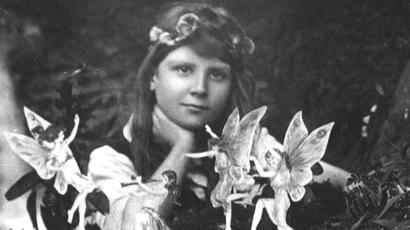 A century ago, two teenage girls in England had some fun challenging the self-regard of grownups. They found a children’s book filled with pictures of winged fairies, cut these figures out of the book, then took photographs of themselves interacting with these sprites. They presented these photos to the grownups in their lives as evidence of the supernatural.
A century ago, two teenage girls in England had some fun challenging the self-regard of grownups. They found a children’s book filled with pictures of winged fairies, cut these figures out of the book, then took photographs of themselves interacting with these sprites. They presented these photos to the grownups in their lives as evidence of the supernatural.
News of this “discovery” made its way to Sir Arthur Conan Doyle, a physician, creator of Sherlock Holmes, and a self-proclaimed spiritualist. He took the girls’ bait and used these photos to support his own teachings about the spiritual realm. In his book, The Intelligence Trap, author David Robson uses this case as an example of how proudly-intelligent experts often let their own biases overpower their wisdom. The results can be comical as this example shows, or tragic, as when personal biases lead medical professionals to misdiagnose patients—costing lives. A recent Wall Street Journal critique of Robson’s book uses it to suggest that young professionals in training need to take up the study of wisdom while in University.
Wisdom is definitely a special need. Unfortunately, our culture has come to equate “special needs” with weakness rather than strength. My wife and I come from families with people our culture would consider “special-needs” members. However, our family has gained a lifetime of wisdom through decades interacting with other “special-needs” families. Many of these interactions involve sharing the wisdom, strength and courage gained from helping our loved ones navigate every-day life. We’ve come to believe in these qualities as spiritual gifts and miracles in themselves. Some might ask, “How could a merciful God inflict physical and mental disabilities on His children?” The answer can be found in this Sunday’s Mass readings.
The first, from Isaiah (Is 66:18-21), tells how God uses fugitives from all walks of life to spread the hope of his truth.
I come to gather nations of every language … from them I will send fugitives to the nations … to the distant coastlands that have never heard of my fame, or seen my glory; and they shall proclaim my glory among the nations. They shall bring all your brothers and sisters from all the nations as an offering to the LORD.
Life is hard for everybody, but returning to the Lord for regular refills of wisdom, strength and courage raises leaders from among humanity’s refugees—including those with “special needs.” After all, everybody needs those three Divine gifts for spiritual and physical survival. Sunday’s second reading from Paul to the Hebrews (Heb 12:5-7, 11-13) offers us special education for applying them.
Endure your trials as “discipline;” God treats you as sons. For what “son” is there whom his father does not discipline? At the time, all discipline seems a cause not for joy but for pain, yet later it brings the peaceful fruit of righteousness to those who are trained by it.
Maybe this will help some of those wondering how our God could be such a tough disciplinarian. However, there will undoubtedly be many remaining as skeptical about Him as Sir Arthur Conan Doyle SHOULD have been about his paper fairies. That might inspire believers who are worried about the faithless in their families to ask the same question Jesus is asked in Sunday’s gospel reading (Lk 13:22-30): “Lord, will only a few people be saved?”
He answered them, “Strive to enter through the narrow gate, for many, I tell you, will attempt to enter but will not be strong enough.”
Our special-needs family believes in a spirit that transcends the limits of our muscles and yields observable miracles of wisdom, strength and courage every day. Maybe by reconnecting with our spiritual selves, and with each other, all of humanity could strengthen a faith made weak by chasing paper fairies.
–Tom Andel